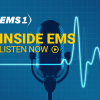Download this week’s episode on iTunes, SoundCloud or via RSS feed
In this week’s Inside EMS Podcast, hosts Chris Cebollero and Kelly Grayson discuss next generation 911 technology, and the opportunities it provides for the future of EMS.
EMS1 asked readers on Facebook to weigh in with thoughts on 911 technology that mirrors communication advances to incorporate data, including text messaging, photos and videos, into the dispatch system.
“This just opens whole possibilities of new ways that we’re going to be able to do our job,” Cebollero said.
Obviously there will be growing pains, Grayson said, but how often do EMS providers get a call for ‘unknown medical’ where they have no idea what kind of scene they’re going to? Take a collision, for example.
“What if over your data terminal you have bystander video of the crash?” Grayson said. “Wouldn’t that be useful.”
Dispatch could also send that video to a hospital trauma center, even before EMS got to the scene.
The technology has raised some concerns about HIPAA violations, but Grayson and Cebollero were skeptical it would be a problem. A video from a car crash, for instance, is not a violation of a patients’ right to privacy, even if it captured someone’s license plate, Grayson said.
“I don’t really thing that the HIPAA angle is all that valid,” Grayson said. “There may be issues that do come up … but I don’t think so in the vast majority of cases.”
He said it would be helpful in low services areas, where someone with one bar couldn’t make a cell phone call but could send a text.
“Where I really see the potential,” he said, “is for the people who can’t talk. You don’t have to worry about TDD services – or for someone who is in a potential hostage situation.”
They brought up a dispatcher who deciphered a woman’s call for a pizza order as a report of domestic abuse. With next generation 911 technology, she could have simply texted, or even taken video of the abuse.
“I’m all for this,” Cebollero said. “We’re starting to see some great transformations in our career field.”
Save a life by reaching out to depressed colleagues
Cebollero and Grayson also highlight the importance of peer support in light of an investigation into the death of a 24-year-old Pa. firefighter and EMT found dead in her car which was parked in a parking lot.
Chelsea Michalesko, 24, was a firefighter for Harwood Fire Company and an EMT with Freeland/Northside Ambulance. The circumstances surrounding her death are under investigation.
“We hope that PTSD and depression didn’t take another life of one of our colleagues,” Grayson said. “We certainly hope that isn’t the case, but it has affected others.”
Two Idaho EMS providers at Ada County Paramedics died by suicide within the last six months, and the PIO wrote an article about trying to understand what EMS providers experience.
“There’s nothing that will work as well as active peer support, and letting the person sitting 18 inches away from you know that you’ve got their back,” Grayson said. “Reach out to each other.”
In the News
Cebollero and Grayson discuss an ambulance theft in Texas where a 34-year-old patient left the emergency room and sped away in the rig, leading police on a high-speed chase that ended when they used spike strips to stop the vehicle.
“One of my biggest pet peeves is, as a leader, I always go by and I always lift the handles of the ambulances just to make sure they’re locked,” Cebollero said. “You’re starting to see more and more that our ambulances are taken because their running, because they’re left open.”
They also talk about proposed Idaho legislation that would allow EMS responders to bill for non-ER transports. It opens the door to treat and release, treat on scene, and to transport to an alternate destination.
“It may empower or incentivize community paramedicine and mobile integrated health care,” Grayson said.
While there’s no mention of whether it applies to Medicare reimbursement, at the very least it’s an example of one state trying to move things forward, Grayson said.
Cebollero mentioned Minnesota and Missouri are other states practicing or pushing for similar legislation, and it’s an issue that’s being looked at on a national level.
Out of London, they mention a story about a medic found guilty of misconduct for leaving patients in an ambulance, twice, to go shopping and to get a haircut.
“Are you kidding me? This is probably one of the worst things I have ever seen in my 30-year career.” Cebollero said.
“This just sounds like a medic whose ‘give a crap’ level is at an all-time low, and he didn’t care about the consequences,” Grayson said.












